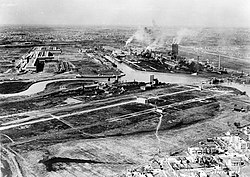Ford Rouge Plant
|
Ford River Rouge Complex
|
|

Aerial view of the Rouge Complex in 1927
|
|
| Location | Dearborn, Michigan |
|---|---|
| Area | 900 acres (360 ha) (landmarked area) |
| Built | 1917–1928 |
| Architect | Albert Kahn |
| NRHP reference # | 78001516 |
| Significant dates | |
| Added to NRHP | June 2, 1978 |
| Designated NHLD | June 2, 1978 |
| Designated MSHS | December 14, 1976 |
The Ford River Rouge Complex (commonly known as the Rouge Complex or just The Rouge) is a Ford Motor Company automobile factory complex located in Dearborn, Michigan, along the River Rouge, upstream from its confluence with the Detroit River at Zug Island. Construction began in 1917, and when it was completed in 1928, it was the largest integrated factory in the world.
It inspired the GAZ factory built in the 1930s in the Soviet Union, and the later Hyundai factory complex in Ulsan, South Korea, which was developed beginning in the late 1960s. Designed by Albert Kahn, the Rouge was designated as a National Historic Landmark District in 1978 for its architecture and historical importance to the industry and economy of the United States.
The Rouge measures 1.5 miles (2.4 km) wide by 1 mile (1.6 km) long, including 93 buildings with nearly 16 million square feet (1.5 km²) of factory floor space. With its own docks in the dredged Rouge River, 100 miles (160 km) of interior railroad track, its own electricity plant, and integrated steel mill, the titanic Rouge was able to turn raw materials into running vehicles within this single complex, a prime example of vertical-integration production. More than 100,000 workers were employed there even during the Great Depression of the 1930s.
Some of the Rouge buildings were designed by architect Albert Kahn. His Rouge glass plant was regarded at the time as an exemplary and humane factory building, with ample natural light provided through windows in the ceiling. Since the late 20th century, several buildings have been converted to "green" structures with a number of environmentally friendly features.
...
Wikipedia

